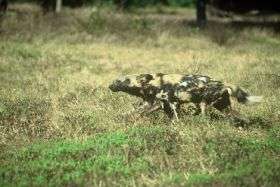Wild dogs reveal nature's 'poverty trap'

(PhysOrg.com) -- Hunting in a fast-moving pack is a high-risk strategy, according to research by Oxford University and Université Paris-Sud scientists.
A new study of African wild dogs has shown that such animals are in constant danger of falling into a ‘poverty trap’ where they spend too much energy on hunting and not enough on reproduction; so that pack numbers fall below the size that is most efficient for hunting.
A report of the research is published in this month’s American Naturalist.
The endangered African wild dog interests scientists because it has adopted an extreme hunting strategy in which packs of, on average, 6-10 individuals run up to 30km a day. These dogs have had to adapt their bodies to this extremely energetic lifestyle – making them lithe and athletic with much smaller stomachs than larger competitors such as lions and hyenas.
This ‘fast-lane’ strategy has many advantages - running enables them to catch a regular food supply which can feed many small stomachs - but the researchers have found it has an ‘Achilles heel’ that makes African wild dogs vulnerable to changing conditions.
‘What our analysis of activity and prey data from 22 packs of African wild dogs shows us is a ‘vicious circle’ where less food energy from hunts leads to less reproduction which in turn leads to smaller packs which then have less success in catching prey,’ said senior author Gregory Rasmussen of Oxford’s Wildlife Conservation Research Unit (WildCRU), part of the Department of Zoology.
‘The poverty trap really starts to bite as pack sizes fall below five and their low hunt success rate means that the dogs have to undertake energy-expensive extra hunts, leaving even less energy for reproduction.’
The new findings will help conservationists understand the ‘energetic tightrope’ walked by many species and how human activity can push populations over the edge.
‘This study shows the extraordinary power of cooperation in animal societies,’ said co-author Professor David Macdonald, Director of the WildCRU. ‘Understanding the relationship between energy and cooperation is not only important to the survival of these stunningly beautiful, yet highly endangered, wild dogs but understanding the value of ‘pack power’ helps us better appreciate the principles that have driven the evolution of our own social lives.’
The research was undertaken by Gregory S A Rasmussen (Oxford University) and co-authored by Markus Gusset (Oxford University), Franck Courchamp (Université Paris-Sud) and David W Macdonald (Oxford University).
Provided by Oxford University

















